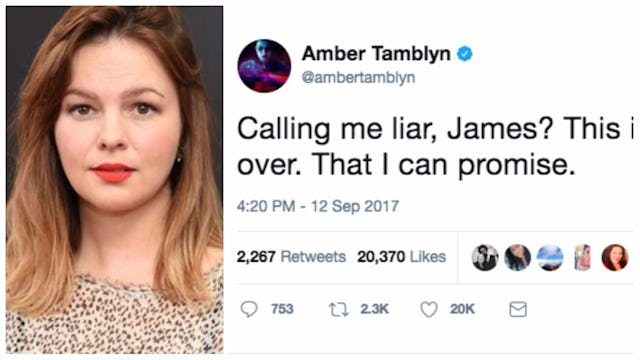Actress Amber Tamblyn Calls Out Sexual Harassment in Powerful Essay

Amber Tamblyn rips actor James Woods and doesn’t hold back about harassment in Hollywood
Amber Tamblyn just wrote a powerful op-ed in The New York Times detailing her experiences with sexual harassment in Hollywood and the painful silencing that followed.
She recalls being on the set of a successful TV show when she was 21, “A crew member kept showing up at my apartment after work unannounced, going into my trailer while I wasn’t in it, and staring daggers at me from across the set.” She explains that he was “sweet and kind” in the beginning. She admits to flirting a bit with him, but says she was in a relationship so she wasn’t going to let it go any further. She says even if the crew member liked her, he was being really over the top and it made her “feel unsafe.” Rightfully so.
She decided to tell the show’s producer about the unwanted attention from the crew member. To which he said to her, “Well, there are two sides to every story.” Tamblyn was silenced. Like so many women.
The actress then went on to describe the struggles women in America have when they are faced with sexual harrassment and grapple with whether or not to report it and speak up.
“Women do not get to have a side. They get to have an interrogation,” she writes. “Too often, they are questionned mercilessly about whether their side is legitamate. Especially if that side happens to accuse a man of stature, then that woman has to consider the scrutiny and repercussions she’ll be subjected to by sharing her side.” She’s right, and this is how women who face harrassment are revictimized by the very system that claims to protect them.
“Every day, women across the country consider the risks. That is our day job and our night shift. We have a diploma in risk consideration,” she writes. “Consider that skirt. Consider that dark alley. Consider questioning your boss.”
She’s right. As women, we are relentlessly assessing the risks and performing mental threat scans of our environment. And it’s sad. It’s exhausting. It’s reprehensible.
The actress then explains what compelled her to the write the very candid op-ed in the first place. She was having a Twitter conversation about her friend, Armie Hammer’s forthcoming film in which a 24-year-old and a 17-year-old are in a relationship. She says it escalated with actor James Woods chiming in and speaking critically about the film, even though he, himself, is allegedly known for dating much younger women.
This Twitter discussion triggered Tamblyn of an experience she had when she was 16 with Woods. She says Woods approached her at a diner and asked if she wanted to go to Las Vegas with him for the night.
Tamblyn wrote about the encounter in an open letter in Teen Vogue just days before the NYT op-ed came out.
“‘It’s such a great place, have you ever been?’ You tried to make it sound innocent. This is something predatory men like to do, I’ve noticed. Make it sound innocent. Just a dollop of insinuation. Just a hair of persuasion. Just a pinch of suggestion,” Tamblyn writes.
“‘It will be so much fun, I promise you. Nothing has to happen, we will just have a good time together,'” she claims Woods said to her. “I told you my age, kindly and with no judgment or aggression. I told you my age because I thought you would be immediately horrified and take back your offer. You laughed and said, ‘Even better. We’ll have so much fun, I promise.'”
On Twitter, Woods denied the whole thing.
To which Tamblyn wasn’t having it.
Tamblyn knew that would happen so she followed up with a screenshot of a text conversation she had with someone she was with the night Woods offered Vegas to her.
“Since I know people love to question the intengrity and honesty of women when they come forward with stories like this, here you go,” she wrote.
She alleges she’s also not the only one with stories about the actor.
“Disbelief is not just about men disbelieving us. It is about our own disbelief in ourselves,” she writes in her scathing Op-Ed. “I have been afraid of speaking out or asking things of men in positions of power for years. What I have experienced as an actress working in a business whose business is to objectify women is frightening.”
Her bravery in coming out with this is punctuated by her last sentence,
“The women I know, myself included, are done, though, playing the credentials game. We are learning that the more we open our mouths, the more we become a choir. And the more we are a choir, the more the tune is forced to change.”
This article was originally published on